-
Courses

Courses
Choosing a course is one of the most important decisions you'll ever make! View our courses and see what our students and lecturers have to say about the courses you are interested in at the links below.
-
University Life

University Life
Each year more than 4,000 choose University of Galway as their University of choice. Find out what life at University of Galway is all about here.
-
About University of Galway

About University of Galway
Since 1845, University of Galway has been sharing the highest quality teaching and research with Ireland and the world. Find out what makes our University so special – from our distinguished history to the latest news and campus developments.
-
Colleges & Schools

Colleges & Schools
University of Galway has earned international recognition as a research-led university with a commitment to top quality teaching across a range of key areas of expertise.
-
Research & Innovation

Research & Innovation
University of Galway’s vibrant research community take on some of the most pressing challenges of our times.
-
Business & Industry

Guiding Breakthrough Research at University of Galway
We explore and facilitate commercial opportunities for the research community at University of Galway, as well as facilitating industry partnership.
-
Alumni & Friends

Alumni & Friends
There are 128,000 University of Galway alumni worldwide. Stay connected to your alumni community! Join our social networks and update your details online.
-
Community Engagement

Community Engagement
At University of Galway, we believe that the best learning takes place when you apply what you learn in a real world context. That's why many of our courses include work placements or community projects.
2011
All 2011
Global Research Consortium Involving NUI Galway Decodes the Genome of Pigeonpea
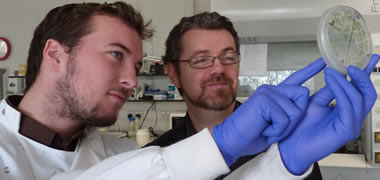
Monday, 7 November 2011
Legume genome sequence to improve livelihoods of poorer smallholder farmers in the dryland tropics in Africa and Asia A global scientific team, including Science Foundation Ireland (SFI) funded scientists from the Plant and AgriBiosciences Centre (PABC) at NUI Galway, have succeeded in sequencing the entire DNA genome of a legume crop of the poor called pigeonpea. Pigeonpea is a staple food for millions of the world’s poorest people who live in semi-arid regions where only drought-tolerant crops such as pigeonpea can be cultivated. Pigeonpea, grown on about 5 million hectares in Asia, sub-Saharan Africa and South-Central America, is known as the ‘poor people’s meat’ because of its high protein content, it provides a well-balanced diet when accompanied with cereals. An improved understanding of the pigeonpea genome will have a major impact on improved crop productivity, tackling pests and disease constraints in production, and improved resistance to harsh environments and the future variable climate. The international initiative to sequence the pigeonpea genome was led by Dr Rajeev Varshney from the International Crops Research Institute for the Semi-Arid Tropics (ICRISAT) and harnessed the research capacity of research labs from India, China, USA and Ireland. Professor Charles Spillane, Dr Mark Donoghue and PhD student Reetu Tuteja from the NUI Galway Plant and AgriBiosicences Centre (PABC) were scientific partners involved in the international initiative leading to the research breakthrough. Professor Charles Spillane, Head of Botany and Plant Science at NUI Galway, highlights that: “Pigeonpea is a staple food crop of millions of poorer smallholder farmers in Asia and Sub-Saharan Africa. While crops such as pigeonpea are essential to food and livelihood security in developing countries, such crops of the world’s poorest peoples are considered orphan crops as there is limited scientific research applied to the development of improved higher productivity varieties due to a lack of commercial incentives. Crop improvement research on such crops is predominantly financed as a public good, through the efforts of non-profit humanitarian scientific institutions such as ICRISAT. Here in the NUI Galway Plant and AgriBiosicences Centre we are working closely with ICRISAT, and a range of other agricultural research for development partners, to help advance pro-poor plant and agribiosciences research. Our activities aim to support the goals of Irish Aid in relation to the Hunger Task Force recommendations to improve smallholder productivity and reduce malnutrition in sub-Saharan Africa.” Professor Spillane, further adds that: “Plant and agribiosciences research for sustainable development will play an increasingly important role in helping to meet future food and livelihood security needs of the ‘bottom billion’ currently suffering from undernutrition and fragile livelihoods. Of the 7 billion people currently on the planet, the food security needs of over 1 billion people are not being met. Rapidly increasing demand for food and other agriculture derived resources will necessitate major increases in crop productivity (yield per unit hectare) if food production is to double by 2050 to meet projected demand. This will require increased and accelerated public-sector investment in pro-poor crop improvement research to meet the needs of the 1 billion poor whose livelihoods are dependent on staple crops such as pigeonpea.” The completed genome sequence of pigeonpea is being published in the scientific journal Nature Biotechnology, which is the highest ranked international journal in the area of biotechnology. The paper provides an overview of the structure and function of all of the 48,860 genes that define what makes a pigeonpea plant. It also reveals valuable clues on how the genome sequence can be harnessed to accelerate crop improvement for sustainable food production particularly in the marginal environments of Asia and sub-Saharan Africa. For instance, a couple of hundred of these genes were found to be unique to the crop in terms of drought tolerance, an important trait that can be harnessed for other similar legume crops like soybean, cowpea or common bean. At present, it can take 6-10 years of crop genetics research to breed a new variety of pigeonpea. With the use of this new genome sequence data, in the future, it should be possible to develop improved pigeonpea varieties for smallholder farmers within 3 years. NUI Galway has recently entered into a Research Alliance with ICRISAT to combine efforts, expertise and capacity in order to advance Plant and AgriBiosciences research for poverty reduction in developing countries in the semi-arid tropics (particularly in sub-Saharan Africa). Covering 6.5 million square kilometers of land across 55 countries, the semi-arid tropics has over 2 billion people, and 644 million of these are the poorest of the poor. ICRISAT and its partners help empower these poor people to overcome poverty, hunger and a degraded environment through crop and agricultural research. “The mapping of the pigeonpea genome is a breakthrough that could not have come at a better time. Now that the world is faced with hunger and famine particularly in the Horn of Africa brought about by the worst drought of the decades, science-based, sustainable agricultural development solutions are vital in extricating vulnerable dryland communities out of poverty and hunger for good,” says ICRISAT Director General William D. Dar, who visited Galway earlier this year to meet with the President of NUI Galway Dr Jim Browne. “Modern crop improvement technologies for smallholder farmer crops such as pigeonpea will be crucial to speed up the development of improved varieties that can provide high yields and improved livelihoods, and at the same time meet the challenges of marginal environments and the threat of climate change and scarce natural resources," adds Dar. Pigeonpea is the first ‘orphan crop’, the first ‘non-industrial crop’ and the second food legume (after soybean) for which plant scientists have succeeded in sequencing the genome. The sequencing was accomplished by a global research partnership, the International Initiative for Pigeonpea Genomics (IIPG), led by ICRISAT with plant genome research partners such as BGI – Shenzhen (China), the National University of Ireland Galway, US research laboratories like University of Georgia, University of California-Davis, Cold Spring Harbor Laboratory, and National Centre for Genome Resources, and also support from the CGIAR Generation Challenge Programme based in Mexico. -ends-
>> Read full story about Global Research Consortium Involving NUI Galway Decodes the Genome of Pigeonpea
Five of Ireland’s Top Artists Will Fuse Their Talents for One-off Free Performance
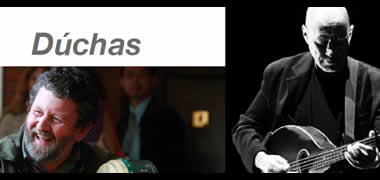
Monday, 7 November 2011
Five original performers will bring their fusion of music, song, sean-nós singing and contemporary dance for a special one-off free performance at lunch time in NUI Galway this week. On Friday, 11 November, from 1-2pm, five performers, two of which are original Riverdance musicians, will perform in the Bailey Allen Hall at NUI Galway. This is a unique occasion as these performers come from diverse backgrounds and will fuse their amazing talents together to bring a show worthy of national acclaim. Piper Ronan Browne, contemporary dancer Cindy Cummings, singer Seán Tyrrell, sean-nós singer Róisín Elsafty and bodhrán player Tommy Hayes will grace the stage of the Bailey Allen for the next instalment of great music on Friday November 11. This performance is part of Arts in Action, NUI Galway’s concert series which brings a wealth of new and established acts to the campus during the term. So far this year, multi award winning pianist Mícheál Ó Súilleabháin and emerging new writer Kevin Barry are just two of the acts that have wowed audiences. Ronan Browne is the original piper with Riverdance. Since his rise to international stages across the globe, he has composed for film and television, has seen huge success with the groups Elsafty Armstrong Browne and Tyrrell Glackin Browne. As well as uilleann pipes, he plays concert flute, whistle and sings. Róisín Elsafty comes from Connemara, and also grew up in a musical family. Her mother, well-known singer Treasa Ní Cheannabháin, inspired Róisín to learn ‘old-style singing’ from an early age. Róisín has travelled widely with her art, performing, demonstrating and teaching sean-nós. American born contemporary dancer Cindy Cummings studied Dance and Theatre at the University of Oregon, and in New York City. As a choreographer, performer and improviser, her work is an adventurous mix of contemporary and traditional dance techniques from around the world, the majority of which are collaborations in a diverse range of mediums and settings. Seán Tyrrell’s musical journey is truly noteworthy and charts the success of a singer whose talents came to the surface after singing in the US. In 1999 he released his much anticipated album, ‘The Orchard’. The album was met with critical acclaim, as Seán was voted Best Overall Folk Act and the album was voted Best Folk Album by the readers of Irish Music Magazine. Making up the quintet is Tommy Hayes who has been at the forefront of traditional Irish music for over 30 years. He was a member of Stockton’s Wing from the band’s inception in 1977 to 1983. He then moved to the United States where he toured for five years and recorded one album on Windham Hill Records. Returning to Ireland in 1989, Tommy was the original percussionist for Riverdance and performed with the shows in Dublin, London, Washington DC and Belfast. With such fine musical minds coming together for a one off event, NUI Galway’s Arts in Action has managed to bring something very special to audiences both on and off campus. The event is free and the concert will kick off at 1pm on Friday, 11 November. For further information, contact 091 493958. -ends-
>> Read full story about Five of Ireland’s Top Artists Will Fuse Their Talents for One-off Free Performance
European Genetic Privacy and Discrimination Policy Focus of NUI Galway Conference
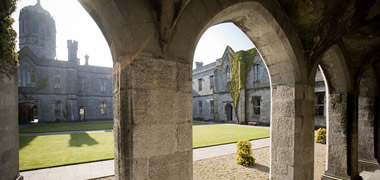
Monday, 7 November 2011
The Centre for Disability Law and Policy at NUI Galway will co-host a conference with the Burton Blatt Institute entitled ‘Genetic Discrimination – Transatlantic Perspectives on the Case for a European Level Legal Response’. The one-day conference will take place on Saturday, 19 November, in Áras Moyola, NUI Galway. The purpose of this conference is to examine the case for a European level legal and policy response to protect the privacy of genetic information and to prevent genetic discrimination, particularly in the employment and insurance contexts. The science of genetic testing and related technology is in the process of advancing. Among other things, genetic testing technology may well offer the prospect of being able to detect the onset of future disabilities. The technology is becoming more prevalent and is being used increasingly in both the employment context and the insurance context. If insufficient protections are not in place to prohibit the misuse or discriminatory use of that information by third parties like employers, insurance companies, educational facilities, then such a legislative and policy vacuum could further setback the inclusion of persons with disabilities and older people into the community. To date, there is no European level regulation protecting the privacy of such information or protecting against the discriminatory use of such information. Professor Gerard Quinn, Director of the Centre for Disability Law and Policy at NUI Galway, said: “This conference is exciting because it looks forward and not backward. It looks to the positive potential of new genetic information technology in detecting future disabilities. And it also looks at the need for appropriate regulation to ensure personal genetic information is not misused. It seeks to learn from good transatlantic developments in the US and seeks ways of ensuring that information privacy is respected in Europe and Ireland. I recommend it to anyone interested in new technology and disability.” For further information, or to register, contact Aisling de Paor in the Centre for Disability Law and Policy at 091 494017 or aisling.depaor@nuigalway.ie. -ENDS-
>> Read full story about European Genetic Privacy and Discrimination Policy Focus of NUI Galway Conference
NUI Galway Features Prominently at Annual NUI Awards Ceremony
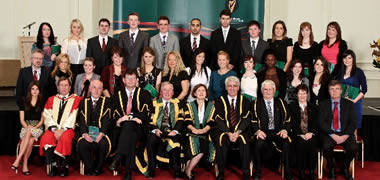
Friday, 4 November 2011
Graduates and students of NUI Galway featured prominently at the annual NUI Awards ceremony which took place this week in the Royal Hospital Kilmainham taking home an impressive 34 awards. Five NUI Travelling Studentships in the Humanities and the Social Sciences and in the Sciences were awarded to NUI Galway graduates: Bríd Ní Ghráinne, Law; Fiona Morrissey, Law; Ciara Kyne, Chemistry; Eimear Dolan, Engineering; and Niamh Fahy, Orthobiology/Regenerative Medicine. Other scholarships and awards include the Dr Mary L Thornton NUI Scholarship in Education which was awarded to NUI Galway’s Hannagh McGinley. The Dr Henry Hutchinson Stewart Literary scholarships and prizes were awarded to: Niall Culligan, English; Síle Dolan, Gaeilge; John Mooney, German; Shaun Murphy, Latin; and Rebecca, Spanish. The French Government Medal and NUI Prize for Proficiency in French was awarded to Philip Morrow. The scoláireacht agus Duais Chiste Theach an Ardmhéara/Mansion House Fund Scholarship and prizes went to Dara Folan, for a Scoláireacht Gaeilge and an Irish History prize and to Colm Ó Cuaig for a Gaeilge prize.A total of nineteen Dr Henry Hutchinson Stewart Medical Scholarships and Prizes were awarded to NUI Galway’s School of Medicine. The award recipients were Cillian McNamara and Karen McNamara, Biochemistry; Danielle Anstett and Julianne O’Shea, General Practice; Larissa Higgins and Teresa O’Dowd, Gynaecology and Obstetrics; Cliona Small, Medical Microbiology; Siobhan Eccles, Midwifery; Ester Afolalu and Laura M Coyne, Nursing; Orla Ní Ghríofa and Mairead Crowley, Occupational Therapy; Larissa Higgins, Paediatrics; Miroslawa Gorecka, Pathology; Elaine Fallon, Public Health; Laura Tobin, Speech and Language Therapy; Yasir Loai, Pharmacology; Matthew Smyth, Physiology; and Gerard Healy MB BCH BAO Hons, Surgery. Speaking on the success of NUI Galway students and graduates, President Jim Browne, said: “This clearly highlights the high calibre of students studying on NUI Galway programmes and follows previous successes in these annual awards. I congratulate each of the Award recipients on their achievement, which will add to their academic reputation. I commend the Award recipients and I pay tribute to their teachers for their work in supporting students and helping them to achieve such high standards.” At the ceremony, the Chancellor, Dr Maurice Manning presented Travelling Studentships, scholarships and other awards to over one hundred students and graduates of the NUI Constituent Universities and Recognised Colleges. The total value of NUI Awards in 2011 was almost €700,000. In 2011, over one hundred students and graduates from the constituent universities and recognised colleges of the federal university received awards. UCD, UCC, NUI Maynooth, NUI Galway, RCSI and NCAD were represented in the award winners. Ends
>> Read full story about NUI Galway Features Prominently at Annual NUI Awards Ceremony
NUI Galway Award Winners Create Technologies of the Future
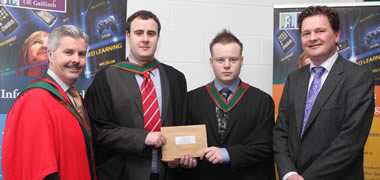
Friday, 4 November 2011
Interactive Policy Simulators for Urban Dynamics, Web Visualisation of Weather Station Data, Smartphone systems to help you get your morning or afternoon coffee without queues! These are just some of the new technologies that graduates of the Information Technology discipline at NUI Galway have won awards for this week. Prizes were awarded to students who excelled in their projects, which span a wide range of topics, reflecting the diversity of research and career opportunities for graduates of Information Technology. Terry Lyons from Circular Road, Galway, a graduate of the BSc in Computer Science and Information Technology developed a software system that involved the design and implementation of a computer game to model an urban environment. The key contributions included a mathematical modelling engine encompassing continuous and Markov equations and a Game Engine architecture based on Microsoft XNA technology. Terry was awarded the Best Project in the BSc in Computer Science and Information Technology, sponsored by Cisco Systems. On a completely different type of application, Colin Divily from Corofin, Co Galway and Naomi Ono, originally from Japan, both students of the HDip / MSc in Software Design and Development, implemented a website visualising the current weather conditions in Galway using real-time weather data collected by a weather station setup by the Informatics Research Unit for Sustainable Energy (IRUSE) who were collaborators on the project. The two students were awarded the Best Project in the HDip / MSc in Software Design and Development, also sponsored by Cisco Systems. For those with an interest in classical and vintage cars, Patrick O’Toole from Moycullen, Co. Galway and Mark Shaw from Tuam, Co. Galway, both graduates of the BA in Information Technology created a Classic Car website. This includes a database that provides information on various manufacturers of classic cars and the various models available. In addition, users can place cars for sale and view cars already available on the website. Information Technology is central to the development of the Smart Economy in Ireland. It is a breeding ground for entrepreneurs and attracts the kind of creative people who want to invent and promote technology based products and services. At NUI Galway, students of the BSc in Information Technology study professional skills and business planning as part of their core academic work. Each year a special Entrepreneurship Prize is awarded for the students who produce the best business plan. These plans are evaluated by external business experts from WestBIC. This year the prize was awarded to John Farrell from Ballaghaderreen, Co Roscommon, Luke Potter from Abbeyknockmoy, Co. Galway and Ernestas Lisauska from Galway, for their “Hey Expresso” system. This system comprises a smartphone application and related server that allows users to pre-order and pre-pay for their morning coffee and therefore avoid the queues! Gerry Lyons, Professor of Information Technology and Dean of the College of Engineering and Informatics at NUI Galway welcomed Cisco Systems as the corporate sponsor for Best Projects in the Information Technology degree programmes: “We believe this is a strong endorsement of the commercial relevance of our degree programmes, and underlines our commitment to innovation, professionalism and research at NUI Galway. We place a huge emphasis on final year project work. These projects are a proving-ground for research and commercial business opportunities. Partnering with a blue-chip global company like Cisco gives students the added motivation and ambition to deliver excellent work.” ENDS
>> Read full story about NUI Galway Award Winners Create Technologies of the Future















